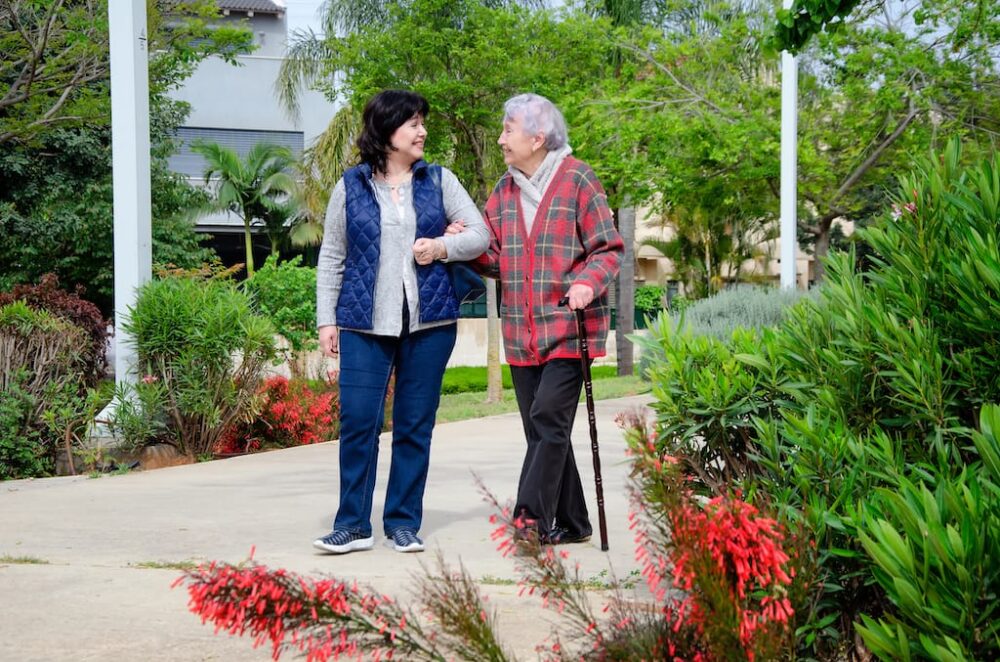We know that being active, experiencing the outdoors, and connecting with others, are all important for our health, wellbeing and life satisfaction – so why not do them all at the same time?
Walk and Talk for Wellness is literally what the name says. It is an opportunity to have a conversation with a trained listener in an outdoor environment. It isn’t about exercising! You choose the pace. The walking is secondary to overall experience of having someone listen and chat with you; a different kind of wellness experience, one which combines the mind and the body.
Research has evidenced that being exposued to natural light and fresh air combined with physical movement like walking has many health benefits. Adding in talking experiences provides even more positive outcomes, including:
- Helping to release emotion, calm the nervous system, energise and motivate
- Boosting mood and reducing stress chemicals in the body
- Better circulation and sleep
- Improved concentration and problem-solving
Sometimes, sitting still and focusing on your difficulties can make you feel more overwhelmed and stuck. Walking and talking side-by-side can help shift a feeling of ‘stuckness’ when trying to deal with problems or issues. There is also a real feeling of accomplishment that comes with having taken action, literally!
About the ‘Walk and Talk for Wellness‘ counselling service
Walk and Talk for Wellness is an initiative developed by the Bachelor of Counselling team at Griffith University and is part of the Gold Coast City Council’s Active and Healthy Program (https://www.goldcoast.qld.gov.au/community/active-healthy-program-27969.html). This program offers a range of free and low-cost activities to the community that are fun, enjoyable and suitable for all ages and abilities. The Walk and Talk for Wellness initiative was launched in July 2020 with sessions running in the Gold Coast Botanic Gardens at Benowa, every Wednesday from 9-12pm as well as on the 2nd and 4th Saturday of the month. The service offers walk and talk sessions with trained facilitators from the counselling program in the School of Applied Psychology. Walk and Talk for Wellness is not clinical therapy, but rather is a non-clinical opportunity for social connection and emotional support.

Background to the program
The impact of nature on mental health and wellbeing is now well evidenced, and there are several different types of therapeutic approaches under the umbrella of Green therapy, Nature therapy or Ecotherapy (Bloomfield, 2017; Chalquist, 2009, MIND, 2015). Some sessions may follow a set structure, and include psychological interventions as would occur in usual clinical practices, however, ecotherapy experiences can also be more informal and vary depending on the time of year and the individual’s goals. The findings show a consistent positive trend, with the strong evidence for improved general well-being which occurs via changes in affect and cognition, mood, capacity for focussed attention, and health factors such as reduced fatigue.
Walking therapy is one particular ecotherapy approach – not to be confused with a personal training exercise. Walking therapy, also known as walk and talk therapy, is essentially a therapeutic or supportive conversation in an outdoor, green and natural environment. The walking is secondary to the conversation or the joining of individual and therapist or facilitator. However, it does provide a different kind of therapeutic experience, which combines the mind and the body in ways that traditional mental health support does not.
Walk and talk experiences can help the individual feel more grounded, and able to release emotion, which in turn boosts mood, and reduces stress hormones adrenaline and cortisol. Exposure to natural light and fresh air combined with light exercise carries opportunities for mood benefits. In particular, walking and talking side-by-side can help shift a person’s sense of ‘stuckness’ as movement can often facilitate psychological processing. Hence, walking in nature often enhances problem solving ability, and creative thinking processes which can impact on the individual’s ability to broaden or shift their perspective.
Walk and talk approaches are particularly useful for people who feel they can become blocked or overwhelmed by the intimacy of a room or office setting. Finally, even gentle walking is exercise, and this can promote a better sleep cycle as well as improve self-esteem (Doucette, 2004; Marselle, Irvine & Warber, 2014).
How does it work?
Community members can book themselves into a Walk and Talk session via the online bookings site. Each session combines a one-on-one and small group environment (up to 4 people with facilitators).
Trained facilitators for the walk and talk sessions are staff and final year Bachelor of Counselling students, who are skilled in connecting and engaging with people from all walks of life. Each session is driven by the goals of the individual, and can range from walking in silence and quiet contemplation to discussing issues of difficulty or problems needing to be addressed. As these sessions are not a clinical intervention, any individuals who need formal psychological support will be referred to an appropriate service. Facilitators are trained in triage and referral processes, and are able to identify when additional support may be necessary.
How to join ‘Walk and Talk for Wellness‘
For bookings please email the team at [email protected] or via phone on 0448 575 548. For more information you can visit their website at https://www.walkandtalkforwellness.com/
Costs for each Walk and Talk session are only $5




